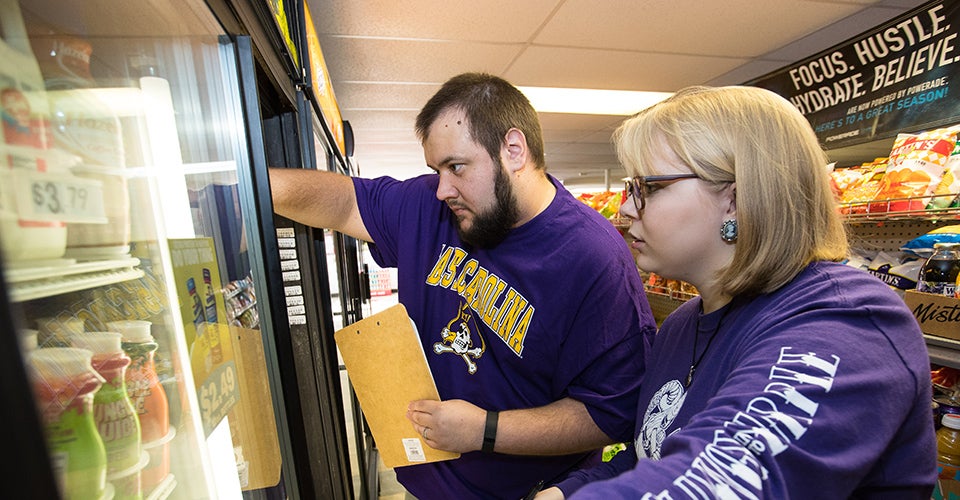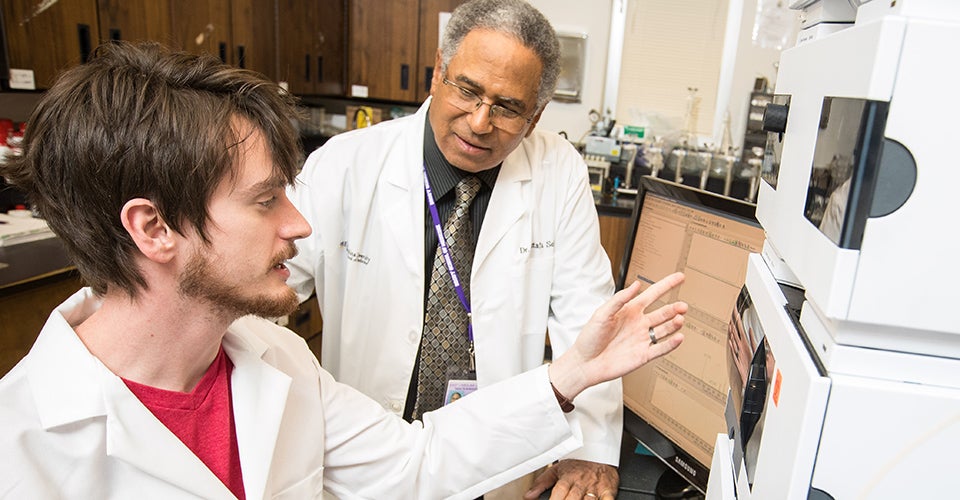FUNDING NEW RESEARCH
Brody Brothers Endowment funds nine projects with annual grants
Nine grants totaling nearly $225,000 will boost research at East Carolina University that targets local, regional and global health concerns this academic year, thanks to the Brody Brothers Endowment.
“This year, nine projects were funded from a very strong field of 18 applicants,” said Dr. Jeff Smith, the faculty member who led the Brody Brother Research Foundation grant review process. “Most of the awards will directly contribute to afflictions affecting adults and children in our region.”
These seed grants, this year ranging from $16,000 to $38,500 each, often help researchers gather preliminary information needed to apply for larger grants.
Making food safer
With the help of doctoral student Blake Rushing, Department of Pharmacology and Toxicology Professor Dr. Mustafa Selim is using his Brody Brothers grant of $38,600 to study methods for detoxifying foods contaminated with a common and dangerous toxin.
Aflatoxin B1, found in many foods consumed by humans and animals – including corn, wheat, dried fruits and vegetables and dried herbs and spices – is caused by a mold that grows on the foods, Selim said. It has been identified by the World Health Organization as a very potent chemical carcinogen associated with an increased risk of liver cancer.
Selim began his research into Aflatoxin B1 years ago by studying animal feed and was funded by another grant to research farmers’ exposure to aflatoxins in grain dust. Despite the prevalence of aflatoxin in common foods, Selim said methods of controlling it have been ineffective.
“The techniques that had been developed or attempted for controlling it were extremely limited,” he said. “I started thinking about ways to break down the aflatoxin in a way that would be safe for human and animal consumption. Working together, we [Rushing and I] have come up with new approaches of detoxifying or breaking down the toxin in a way that uses safe food agents and doesn’t leave residues or anything.”
Selim and Rushing hope to create a device to detoxify potentially contaminated foods that could be used worldwide, both commercially in factories and in individual homes as people prepare their own food.
Encouraging healthy diets
Dr. Stephanie Pitts, assistant professor in the Department of Public Health, received $22,722 for her research into factors that influence nutrition choices at small retail food stores by individuals with lower socioeconomic status at small retail food stores.
Pitts is testing the effectiveness of labeling practices such as “stop light labeling” – where less nutritious foods are marked with a red stop light and healthier options with a green stop light. – and “physical activity equivalent labeling” – where foods are labeled based on how much exercise it takes to burn off the calories they contain.

Dr. Stephanie Pitts
The grant also allowed Pitts to purchase a new device that detects with the swipe of a finger the level of certain nutrients in the skin. She said her research will involve one of the first uses of this technology in the field.
“Self-reporting diet is notorious for being error-prone,” Pitts said. “If I asked you what you ate yesterday, you couldn’t tell me. Most people couldn’t. You would give an approximation. So we’re going to use this to try to evaluate the corner store project.”
Investigating viral infection
Dr. Brett Keiper, an associate professor in the Department of Biochemistry and Molecular Biology, received a grant for his research about how disease affects protein synthesis in cells.
Keiper said his team’s $30,000 grant will enable them to study a specific set of cells that mimic the Zika virus and how an organism’s proteins are affected when these cells are introduced.
“What we’re doing is mimicking a disease state in a simple genetic worm and saying ‘can we learn something from how protein synthesis changes?'” Keiper said.
Keiper hopes to eventually apply his findings to the human condition of Zika virus infection.
Although Zika will likely not remain a prominent medical issue in the future, Keiper noted, the implications of his research can be applied to how proteins in cells react to other diseases as well.
Three faculty members in the Department of Physiology also received Brody Brothers grants: Dr. Espen Spangenburg, Dr. Joseph McClung and Dr. Jitka Virag. Other recipients are Dr. Samy Morad, research assistant professor in the Department of Biochemistry and Molecular Biology; Li Yang, associate professor in the Department of Internal Medicine and Dr. Jamie DeWitt, associate professor in the Department of Pharmacology and Toxicology.

Graduate students Taras Grinchak, left, and Cami Howell conduct a food survey at Mark’s Food Mart in Greenville as part of Dr. Stephanie Pitts’ research.
